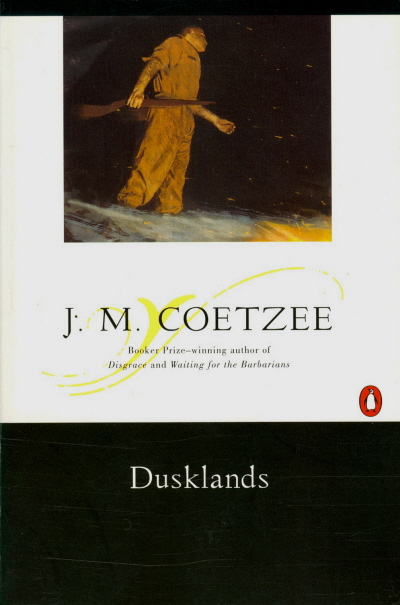"J. M.
COETZEE'S VISION
GOES TO THE NERVE CENTER
OF BEING."
NADINE
GORDIMER
A
shattering pair of novellas
in the tradition of Conrad's Heart of Darkness, Dusklands probes the
link
between the powerful and powerless. "Vietnam Project" is narrated by
a researcher investigating the effectiveness of United States propaganda and
psychological warfare in Vietnam. The
question of power is also explored in "The Narrative of Jacobus
Coetzee," the story of an eighteenth-century Boer frontiersman who vows
revenge on the Hottentot natives because they have failed to treat him
with the
respect that he thinks a white man deserves.
With
striking intensity, J.
M. Coetzee penetrates the twilight land of obsession, charting the
nature of
colonization as it seeks, in 1970 as in 1760, to absorb
the wilds into the Western dusklands.
"Intense,
clear, and
powerful. The promise, so brilliantly fulfilled in his later work, is
clear in
this earliest novel."-Daily Telegraph (London)
"His
writing gives off
whiffs of Conrad, of Nabokov, of Golding, of the Paul Theroux of The Mosquito Coast.
But he is none of these, he is a harsh, compelling new voice." -Sunday
Times (London)
*
The Vietnam
Project
Obviously it is difficult not to sympathize
with those
European and American audiences who, when shown films of fighter-bomber
pilots
vissibly exhilarated by successful napalm bombing runs on Viet-Cong
targets,
react with horror and disgust. Yet, it is unreasonable to expect the U.S.
Government to obtain pilots who are so appalled by the damage they may
be doing
that they cannot carry out their missions or become excessively
depressed or
guilt-ridden.
Herman
Kahn
1.31 Western theory and Vietnamese practice. But the voice
which our
broadcasting projects into Vietnamese homes is the voice of neither
father nor
brother. It is the voice of the doubting self, the voice of Rene
Descartes
driving his wedge between the self in the world and the self who
contemplates
that self. The voices of our Chieu Hoi (surrender/reconciliation)
programming
are wholly Cartesian. Their record is not a happy one. Whether
disguised as the
voice of the doubting secret self ("Why should I fight when the
struggle
is hopeless?") or as that of the clever brother ("I have gone over to
Saigon-so can you!"), they have failed because they speak out of an
alienated doppelganger rationality for which there is no precedent in
Vietnamese thought. We attempt to embody the ghost inside the villager,
but
there has never been any ghost there …
The
propaganda of Radio Free
Vietnam, crude though it may seem with its martial music, boasts and
slogans,
exhortations and anathema, is closer to the pulse of Vietnam
than our subtler
programming of division. It offers strong authority and a simple
choice. Our
own statistics show that everywhere except in Saigon
itself Radio Free Vietnam is the most favored listening. The Saigonese
prefer
U.S. Armed Forces Radio for its pop music. Our figures for Liberation
Radio
(NLF) indicate a small listenership but are probably unreliable.
Figures for
the U.S.-run services are more accurate and indicate low interest
everywhere
except in the cities. The provincial population listens with respect to
the
ferocious war-heroes, humble defectors, and brass-band disk-jockeys of
Radio
Free Vietnam. There is an early-evening commentary program run by
Nguyen Loc
Binh, a colonel in the National Police, which draws an enormous
audience.
Westerners are distressed by Nguyen's crudity, but the Vietnamese like
him
because with rough humor, cajolements, threats, and a certain slyness
of
insight he has worked up a typically Vietnamese elder-brother
relationship with
his audience, particularly with women.

